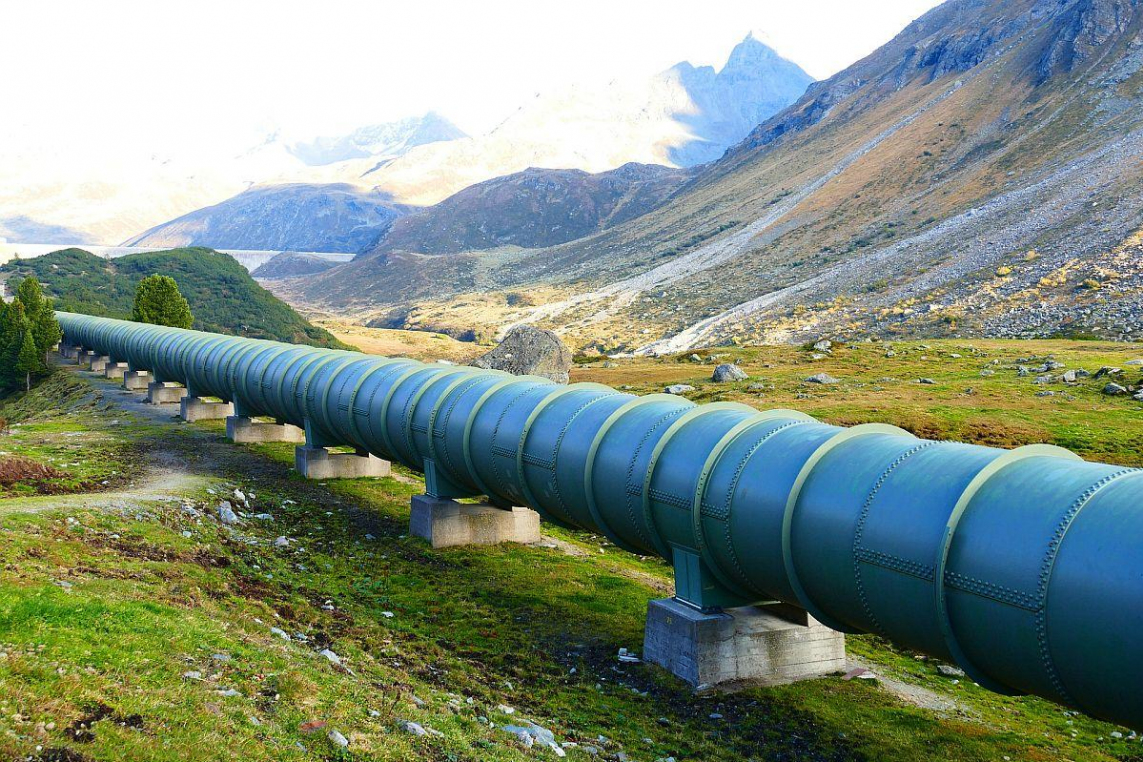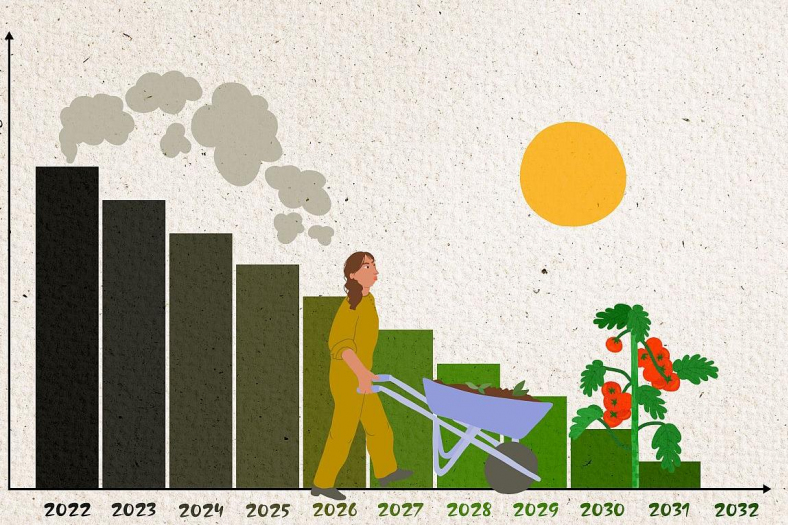Jonas is econoom, schrijver en opiniemaker. Hij is auteur van Genoeg voor iedereen.
Where is that master plan to phase out fossil fuels?

Rawpixel (CC0)
Europe’s dependence on Russian gas, the energy crisis or climate disruption: economist Jonas van der Slycken sees countless reasons for phasing out our use of fossil fuels. But what could a bold policy, which is also social and just, look like? ‘We can afford less and less the usual policy of delay and mainly putting out brush fires.’
Taxing carbon is commonly advocated for reducing fuel use, by making it more expensive. But while progressively designed carbon taxes can save the weakest shoulders from carrying the greatest financial burdens, they are no guarantee of actually keeping fossil fuels underground.
Moreover, carbon taxes may not be enough to achieve zero emissions. After all, we are collectively rich enough to stoke our planet and cheerfully push its inhabitants into climate chaos.
No, to avoid polluters paying – but continuing to pollute – more watertight measures are needed. Especially now that droughts are increasingly getting out of hand.
The Great Drought
The expected Summer of love in 2022, in fact, turned out to be the summer of the Great Drought. The worst European drought so far. With withered leaves everywhere it looked like autumn had already arrived by the end of August. Fauna and flora visibly were groaning under the scarcity of water.
In June thousands of cattle died in the US state of Kansas due to the persistent heat. A month later, Spain and Portugal counted their heat deaths. In Pakistan and India, temperatures reached nearly 50°C in May, eerily close to the ‘thermal limit’ of the human body. A sober and sad conclusion, we can’t cope with much more.
Weather records are broken every year. Weather phenomena are taking on increasingly erratic proportions.
In addition to the human suffering, the economic consequences are also severe. France’s longest river, the Loire, has almost completely dried up. The level of the Rhine also became so low that it harmed the European economy. Ships could only carry a fraction of their usual cargo.
The global economy is shooting itself more and more in the foot by insufficiently curbing the use of fossil fuels.
Make no mistake: with a climate disturbance of 1.2 °C we are already dealing with these disruptions. I hold my breath for the disasters that will occur along the way. Certainly because with current policies we are heading for a climate disruption of 3.2 °C by 2100.
Failed harvests, forest fires, heavy rainfall and the accompanying floods, especially the unimaginable one in Pakistan, I leave aside for our peace of mind. Weather records are now being shattered every year. Weather phenomena are reaching increasingly extreme scales. That’s exactly what climate scientists warned us about decades ago.
Effective answers
Here in Flanders, Belgium, it is good that we use less water and that our drought plan is welcomed. Differently, as long as we don’t reduce the use of fossil fuels, we will remain mopping with the tap open.
What is unfortunately still missing, despite all so-called climate measures (including carbon taxes), is a master plan to drain-down fossil fuels at the source. On the climate front, early action is vital. We can afford less and less the usual politics, which often consist of putting out ‘brush fires’ and avoiding the needed deep systemic action. We are “managing” symptoms, while we should be tackling root causes.
The Edwards and Cox plan also addresses the needs of individuals, families, communities, regions and the economy.
Since we’re already pretending we’re tackling the ecological crisis, why don’t we pretend we really want to defuse it? With practical answers and concrete solutions.
Think, for example, of Larry Edwards and Stan Cox, who came up with a flexible solution to the predicament we find ourselves in, with their ‘Cap and Adapt’ plan.
The two Americans laid out their comprehensive plan in the scientific journal Solutions. Their objective: a policy proposal at national level to rapidly reduce fossil fuel emissions to zero.
The plan is not only fair and just, but also addresses the needs of individuals, families, communities, regions and the economy. For example, by taking into account the different heating needs in colder regions.
While existing solutions are often limited to building renewable capacity or steering behavior through taxes and subsidies, Edwards and Cox’s plan consists of three levels.
First level: waterproof ceilings
The first level consists of determining a so-called cap. This is the maximum amount of fossil fuels that an economy, such as here in Belgium, is allowed to use each year. This concerns the quantities of coal, oil, gas domestically extracted (though none in Belgium) or imported.
These producers are granted non-tradable licenses to place a certain quantity on the market. The licenses are also free, to avoid inflation spirals. If inflation or profiteering should nevertheless arise, price controls can help combat them.
It is important to take trading patterns into account. The laptop I use to write this column is made in China. Since I use the device here, the fossil fuels used must be allocated to Belgium. Further, the policy must not disadvantage businesses subject to competition by imports from nations that don’t have a similar policy in place.
We could reduce Belgian gas consumption to zero by 2032.
Because the consumption of fossil fuels is capped, it is transparently known in advance how much fuels a country can use every year. That’s why ecological economists, degrowth thinkers and the like are such a fan of caps.
Since it is better to phase out the use of fossil fuels as quickly as possible, the cap should decrease in the relatively short term. Ten years, for example. That term would be ideal to complete the transformation.
In these ten years, the use of cubic meters of gas, barrels of oil and tons of coal will decrease in ten equal steps, so that you can really achieve zero emissions by the end. Belgian gas consumption, to give just one example, could be reduced to zero by around 2033 in this way.
The illustration below shows how the amount of fossil fuels used decreases in this ‘ten step staircase to the future’.

The ten step staircase to the future. Y-axis: amount of fossil fuels (in volume/weight)
© Francesca Van Daele
The above Belgian example applies to a country that imports all its fossil fuels. A country that produces such fuels can also cap production. Norway could start annual step-reductions of its gas production now, phasing out by around 2033, instead of further enriching itself on Europe’s reliance on gas while fueling climate chaos.
Second level: mass mobilization
The second level is a massive mobilization of the economy. A kind of ‘Green New Deal’. Such mobilization is necessary to replace the declining use of fossil fuels by developing energy that is 100 percent renewable, electrification that replaces fuel use, an adapted electricity distribution network, and energy savings and efficiency.
Digital ration cards indicate how much fossil fuel people can purchase.
During that transition, it is necessary to allocate declining fossil resources to specific sectors, so that people can always meet their needs. A priority sector here is the electricity sector, so that the transition is made in a timely manner.
It is also essential to reorient certain sectors. That was done before, by the way, during the corona crisis and the economic transition of the United States during the Second World War.
According to Edwards and Cox, the American war economy is an historical example of the scale, scope and speed of mobilization needed today.
Third level: rationing in case of shortages
Finally, if the development of energy alternatives may not keep up with the declining availability of fossil resources, you must fairly distribute what is available. This is done in the form of familiar quantities of volume and weight, not via price as is customary today. Digital ration cards, which individuals would have at their disposal, indicate how much fossil fuels individuals can purchase.
Even without introducing such a plan, there are important lessons to be learned for current policy.
In the event of shortages, those rations will hit the people with the greatest consumption the hardest, and low consumers little if at all. The role of the third level is a just and fair distribution of fuels and the guarantee of electricity, so that everyone’s needs are met.
It is a last resort that can be called upon in dire need, so that the transition takes place in an orderly and socially sustainable manner.
For whom and for what?
A group of European countries, other economic powerhouses or a few others pioneers can take the lead in the implementation of this master plan. This way, they can introduce a new dynamic in the world economy and global geopolitics. Afterwards, other countries could join.
But even without such a plan in place, there are important lessons to be learned for current policies. European countries could accelerate reducing their dependence on (Russian) gas through a cap. Price controls, different priorities in sectoral resource allocation and a fair distribution of fossil fuels to end users are indispensable for a social and just transition.
What are we waiting for to dry up the fossil industry for good?
Unlike taxes on carbon, a cap effectively shrinks fossil fuel use by a concrete date in the near future.
The advantage of an ambitious cap, in contrast to the existing, vague plans with a 2050 horizon, is that it does not postpone comprehensive and difficult decisions, sets out a clear path for the future and effectively shuts down the fossil fuel industry.
In short, for European nations it is a master plan to simultaneously reduce our dependence on (Russian) gas, execute our climate responsibility today and guarantee a social and just transition.
Considering the rate at which life on Earth is evaporating, what are we waiting for to drain the fossil fuel industry for good?
Jonas Van der Slycken is an economist who obtained a PhD from Ghent University in which he investigated how alternative measures of economic welfare can help to go beyond the Gross Domestic Product (GDP) and its growth.
An earlier version of this column appeared in Dutch on mo.be in September 2022.
Maak MO* mee mogelijk.
Word proMO* net als 2798 andere lezers en maak MO* mee mogelijk. Zo blijven al onze verhalen gratis online beschikbaar voor iédereen.
Meer verhalen
-
Report
-
Report
-
Report
-
Interview
-
Analysis
-
Report










 Oxfam België
Oxfam België Handicap International
Handicap International